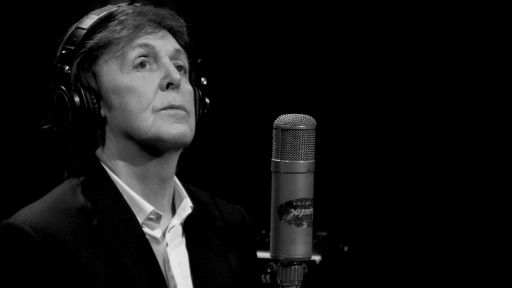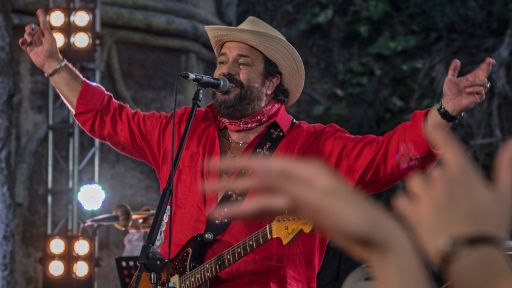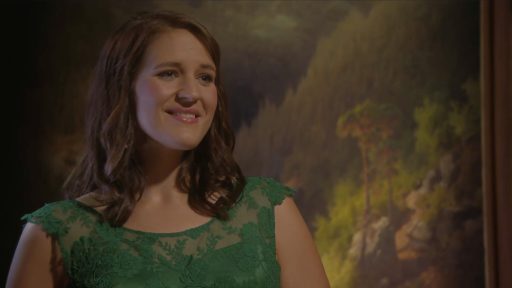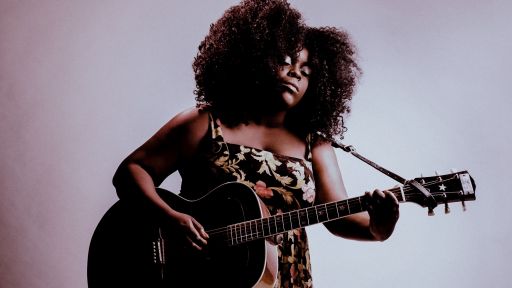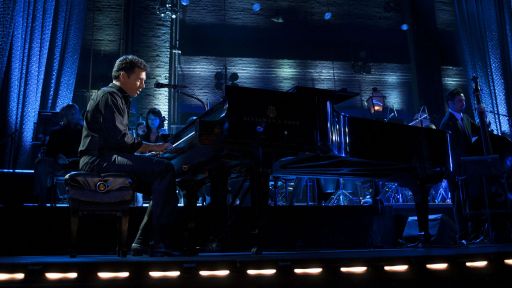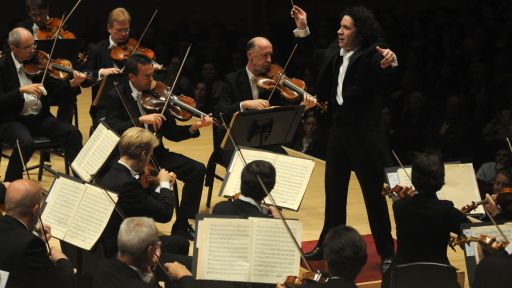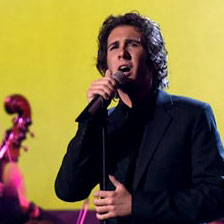 GREAT PERFORMANCES: How did this TV special, JOSH GROBAN IN CONCERT, come about for PBS?
GREAT PERFORMANCES: How did this TV special, JOSH GROBAN IN CONCERT, come about for PBS?
Josh Groban: Well, even back when we were first starting to make the CD, really as far back as when I was in high school, I always dreamed of one day doing a show on PBS, because I had grown up watching so many great PBS performances and being inspired by them. All the shows on GREAT PERFORMANCES — “Sunday in the Park with George” was the first musical I ever saw and it was on TV, it was on PBS, with Mandy Patinkin and Bernadette Peters, and then “Sweeney Todd” with George Hearn and Angela Lansbury. It really kind of introduced me … to a whole new world out there that I wanted to be a part of. So, when we were making the CD and the CD was done and we were trying to build a fan base, I knew that eventually — I had hoped, at least — that I would do a television concert at some point in my career. And I hoped that it would be on PBS. I never thought that it would happen at 21. It was just something that I always kind of knew that I would do, and so the entire process of it was just such a joy to do because it was like a dream come true.
GP: Can you tell me a little bit about the process of doing the PBS special? From the idea to the actual taping.
JG: Well, I had never done a TV special before. I’ve had to build a team around me to make an album, but I’ve never had to work with a team that had so much more to think about than just recording music for an album. We were essentially recording an album, but we were doing it with production trucks and video cameras and an audience and a stage. Filming a TV special is extremely difficult because you’re on a budget, you’re on a time limit, and the pressure is on to get it right, right away. Not to mention the pressure is on for me, to have something in my hand that I’m going to watch for the rest of my life and make sure that it’s something that I am absolutely proud of. So the planning stages were many, many months, in terms of who I wanted to have on the show and what kind of instruments I’d like to have and what the setup would be and how to make it look unique and how to make me appear on stage the way that I’d like to do a show. I wanted the theatricality, but I didn’t want it to go too much in that direction. But on the other hand, I’m not the kind of performer that stands on stage with an orchestra behind him for the whole show.
You know, it was great, I had a great, great team around me, between my manager Brian Avnet and my stage director Danny Ezralow, who also created the show with me, and with lighting by Simon Miles. Just so many amazing people came on board, and we all sat at a big table and we said, “What about this?” “Oh yeah, that would be great,” “What about this?” “That’ll be amazing.” It was just lots of late-night coffee shop talks … then the real tough part started. The stuff that I’m not really used to, the budget meetings, and a lot of roadblocks were put up and we had to work around them and it made finishing the process, and finishing it far beyond anything I would have ever imagined, all the nicer.
GP: You mention “Sweeney Todd”; wasn’t that a show that you’ve always wanted to do? You were in a production of it at Interlochen Center for the Arts, right?
JG: That’s true; it’s so funny. Interlochen wound up being one of the greatest camp/arts school experiences that I’ve ever had. And it all started because shortly after seeing that TV special of “Sweeney Todd” I got word that that particular arts camp, which I had found out was one of the best, was putting on “Sweeney Todd.” And I said, “Oh my gosh, I want be Sweeney, that’s it. I want to be Sweeney.” I was 15 years old [and] part of me knew that there was no chance that I would be able to tackle that role or even get that role, because, you know, the lead roles go [to] the seniors. Well, I went over there and I auditioned my butt off and got Broom Sweep #3, or something like that, in the chorus, and I learned real, real early on, and it was such a valuable lesson for me, to love a show and to put all of your energy into it, whether you’re Broom Sweep #3 or Sweeney Todd. And so I was on stage for five minutes, and every other minute of the show I was sitting at the wing listening to the whole show and just loving it. I had a love for theater from a very early age. I went back the next year and I got a larger role, and … I needed to work my way up that ladder and take voice lessons and take acting classes and take whatever training I needed to be the best performer I could be.
GP: Do you have any aspirations to do more musical theater?
JG: Yeah, oh sure, at some point in my career. I was young then for the high school productions, and I’m young now for the professional productions. I want to get a little older and let my voice mature and put a little age on me before I ever audition for a Broadway show or even opera, way, way down the line. We’ll see, but for now I’m doing exactly what I want to do.
GP: Any thoughts about returning to Carnegie Mellon?
JG: The thoughts, honestly, about returning to Carnegie Mellon in particular, are probably not realistic because of its location. It is an amazing school but Pittsburgh is not, unfortunately, a place where I can be right now. And also, my entire class is graduating now so it would be kind of a bummer to go back to that campus without any of my friends. So, if and when I go back to school, it would probably be somewhere in L.A. or New York.
GP: What’s it like to be dubbed “The New Boy Wonder of Voice” by THE NEW YORK TIMES, at 21?
JG: Wow, that newspaper article basically made my head explode. That was such a nice, nice article — and the comments by Barbara Cook and by some of the great people of New York — it just meant the world to me. I was very, very flattered.
GP: Do you have any plans to go on tour?
JG: I am probably going to do a full-length tour, in March. We’re already setting up a 15- to 20-date tour that is looking really, really good. We have some amazing theaters lined up. It’s great. I think, but I’m not sure about this, that we are going to put tickets on sale on Valentine’s Day.
GP: I’m sure your fans will love that.
JG: Yeah, I think we are expecting a pretty quick sell-out. It’s going to be very exciting for me because I’m going to be able to do what I did for the special, but I’m going to be able to do it over and over again for new audiences, and I have the luxury of being able to make it live. It’s not [going to be] recorded, so I can relax about that a little bit more.
GP: Your fans are wonderful, loyal, and dedicated. How does this affect your work?
JG: Oh, it’s essential. To build a fan base like that, they become part of your team and their opinions are very good ones because they begin to know me for everything that I am. They become the real, real fans. It’s very important to keep them in the loop and keep them happy and keep them communicated with. I try to post on the Web site and let them know what’s going on. And then of course we offer them lots of goodies. We offered them the tickets first for the PBS special; we’re going to give them all a free Christmas song. They have been really amazing. Their phone calls to the TV stations, the letters that they write, the letters that they write to me, the meet-and-greets that they come up with, the name they’ve given themselves [Grobanites], it’s all pretty incredible. It’s really flattering, really wonderful to feel that kind of warmth from so many diverse places and people.
GP: I think your relationship, posting messages on the Web site and really communicating with the fans, contributes to their loyalty.
JG: I hope so. I think every performer understands how important the fans are, but especially for someone like myself, where MTV is not in the picture, pop radio is not in the picture. This is primarily a word-of-mouth album. And the people who were there first, these four or five thousand people on the Web site, they’re the ones who believed in it from the beginning, with me and my team, and they helped make it happen. They are very important.
GP: How do you describe your relationship with David Foster?
JG: David Foster has been the real taskmaster, father figure in the recording industry for me. He discovered me. … He was looking for a singer for Gray Davis’ inauguration — it’s funny ’cause he was just reelected — he had an inauguration concert four years ago, and Michael Crawford was supposed to come in and sing “All I Ask of You” from “Phantom of the Opera” and couldn’t make it; he had a rehearsal he had to do. [David Foster] called my voice teacher at the time [Seth Riggs] and said, “Send me some tapes of some people that you have, we need to pick someone right away.” And he listened to some tapes, and my teacher had said, “Go ahead and make a tape, I’m going to send it to somebody.” So I went off and I made one and sent it to him, and he called me up and said, “Hey, David Foster” — and I had no idea who David Foster was — “Yeah, I want you to come down to the Arco Arena in Sacramento and sing for the new governor.” I thought, “Wow, that’s pretty amazing.” And it was really kind of a turning point for me. It was for 20,000 people, and it was the first time I sang anything professionally and it got a great reaction. Then two weeks later, it was kind of the same situation [for the Grammy Awards rehearsal]: “Andrea Bocelli couldn’t make it, and Céline Dion is here, and would you mind learning ‘The Prayer’ and coming down and singing it with Céline?” I was 17. That was a little harder to say yes to because I didn’t really think that I could do it. Because Andrea Bocelli is like the tenor of tenors, and I was a 17-year-old baritone. And I went and I did do it, and David Foster was the guy to say, “Look, you’re not letting me down. Come down here and do this right now.” And I needed that push, and it wound up being a day that changed my life.
GP: Who else has had a great influence on your life? Musicians, songwriters, composers?
JG: The number of angels who have come down from high places and helped me out, that have said, “You can do this and we’re going to help you,” is incredible. David’s been one of them. Walter Afanasieff, who is a huge Grammy Award-winning writer/producer, is another. David and Walter both have a real love of classical music and orchestration and of arrangement and they look at this as a challenge, but also as a chance for them to stretch their arms out a little bit and try something new. Everyone in this business, to a certain extent, is dictated by formula. When they sit down at a piano, generally speaking, they’ve got orders to come up with that next catchy tune that we’re going to put on the radio and sell a million records. So, when this project was starting and I was trying to find songs and … looking for people to do things with, they kind of looked at this as something refreshing to sit down and play, something that they would want to play over and over again — not because it’s got that tune that nobody’s going to be able to get out of their head. They wrote some beautiful music together. The first song I recorded was “Gira Con Me”; I heard it and I said, “Wow, this is really incredible, guys.” I learned a lot from the great writers — David, Walter. John Williams and I got to work together on the AI soundtrack, on the song “For Always.” That was a thrill and an honor. Ennio Morricone wrote two songs on the album. So I learned a great deal. I sat back and I watched and I learned a lot. And I love to write as well, so I hope to do some collaborating on the next CD.
GP: Oh, you do?
JG: Definitely. I’ve been writing all my life, but when you have those kinds of people collaborating on your album … if they had said to me, “We really don’t know what to do,” I probably would have sat down and come up with a few things. But man, the amount of beautiful music that was handed to me for this CD, I was so honored to have it, I figured, sit back and learn for now.
GP: When do you expect to release your next album?
JG: The next album will hopefully be out in October of 2003.
GP: When you mention the formula, I think that’s very interesting, because you do seem to be outside of any formula one could name. I know you have mentioned that folks at record stores just don’t know where to put your CD.
JG: Well, yeah, it’s very, very difficult, and I have been so blessed and so happy to have the success that I’ve had on the CD, which went double platinum in America, and we’re almost at three to four million worldwide. It has been incredible, but even still, there are so many people out there who just don’t know where to put it or are afraid to enjoy it or afraid to buy it because it doesn’t fit into a formula. And it really kind of opened my eyes to the fact that there is such a risk when you try to break a mold, even a little bit. And it’s why so many people are pressured not to, which is why I give so much kudos to people like David and Walter for deciding to take this on and put so much of their power and money into [it] because, to a certain extent, whenever you decide to go away from what is usually formula and pop, pop rock — and don’t get me wrong, I love that kind of music and that’s the kind of music that makes the world go ’round right now — when you don’t do that, you are going to be discriminated against a little bit. It’s my job now for the rest of my life, I think, to win over those people that are scared of it or aren’t willing to give it a chance.
GP: What are you listening to these days?
JG: What am I listening to? I love world music. I’m listening to a lot of people. I’m listening to Peter Gabriel. Actually an artist I found out about from him, who has a new CD out, called Youssou N’Dour. He’s amazing; he’s an African singer. I’m listening to Coldplay, Radiohead, Björk, Depeche Mode.
GP: Who is the African singer?
JG: Youssou N’Dour, he’s the biggest pop star in Africa, and he has just an incredibly beautiful voice. That’s the thing, I’ve been able to travel around the world this last year and one of the most fun things for me to do is go into music stores around the world and say, “Look, who are your biggest artists here?” And just listen to what the differences are between the cultures and what’s big over there compared to what’s big here. And hopefully find some artists to work with on the next CD and kind of bridge the gap.
GP: That’s a great idea. So, is Youssou N’Dour in your CD player right now?
JG: Actually yes, in my car.
GP: You have had the opportunity to work with some amazing performers. Anyone else that you are hoping to sing with?
JG: I am very much looking forward to singing with a woman in Oslo, Norway. I’m going to be singing for the Nobel Peace Prize concert in Oslo, and I’m going to do “The Prayer” with an enormously popular Scandinavian singer who is just now breaking in[to] America, her name is Sissel. I have not met her yet, but I’ve been a fan of hers for a while, and I am really looking forward to singing with her. I know we have been looking forward to singing with each other for a while. That will be a great time for me. I love Oslo, Norway. My whole mother’s side of my family is from Norway, and I always feel very, very good when I get over there. That will be a thrill for me. [Listen to an interview with Sissel on NPR’s MORNING EDITION.]
Other than that, people I’d like to work with, it’s hard to say, because I have … people who are my fantasy duets that probably, honestly, [it] would be very hard for us to work together. I could say I would love to sing with Björk. But quite honestly, what would we do together? I think it would be kind of a challenge, although that would be really amazing. Sometimes the best collaborations are the ones that are the most unexpected. Certainly on this album, the people that I wound up working with are not the people that I sat around dreaming of working with for my entire life. They were people that kind of came about through fate and it just wound up really, really working. I hope to keep that relaxed feeling about it for the next CD and whatever comes, comes, and we’ll just see what happens.
GP: I have to tell you that since seeing the TV special, I have not been able to get “Sorry Seems to Be the Hardest Word” out of my head, just from that little snippet that you did. Do you think you’ll do an album with songs like that on it?
JG: I think it’s almost positive. This debut album definitely has a mood to it and it has a style to it and it has a feeling to it that’s similar from beginning to end. Is it everything I want to tackle artistically? Absolutely not. It’s a small amount and it’s a style of music. And I’m not going to go too far away from that, but there is a lot more of me that I’d like to get out there, and certainly there are different types of songs that I would like to try singing. And I hope to do that.
Yeah, that little snippet was fun to do. It was cool for David to do that. I’m sure it probably looked pretty scripted on stage, but I swear, I had no idea he was going to say, “Come over and play some piano.” Because I think I had told a couple of people, “You know, if he asks me to go play the piano and I don’t know about it — !” That was totally unscripted, and when he told me to go do that in front of all those people, I was like, “Ugh, just go do it.” Bite my tongue and just go do it. And that song was the first thing that came into my head.
GP: It looked very natural. You mention musical theater possibly in the future; do you have any plans to pursue acting?
JG: Actually, yeah. I’m glad that you brought that up. I’m looking at a lot of scripts right now. Doing the small amount of work that I did on ALLY MCBEAL was just so inspiring to me and so much fun because as a singer you really are acting. You have to find something within you for every song that you sing and then express it to an audience, and it’s the same thing you’re doing with spoken word, you’re just not singing the words. I’ve always had a great fondness for acting. I love it. I’d love to do more of it, whether it be plays or TV or film. We’ll see. There’s not a whole lot of time for anything like that right now, but in the future I think, hopefully, definitely.
GP: You mention in the special that you play the drums and the piano, and obviously you sing. Any other instruments?
JG: In terms of playing instruments, I am very much interested in world instruments, although I’m not really that good at any of them yet. I’m trying to learn the uilleann pipe, which is one of the instruments featured in the special. I am a real great fan of that instrument, and I love other Irish instruments, the Irish low whistle and things like that. But piano and drums are really the main instruments that I play.
GP: Okay, so, five years from now, at the tender age of 26, where will you be?
JG: Oh man, I’ll be 26 years old. Gosh, I’m getting old.
GP: Ancient.
JG: Yeah, five years from now — so much has happened in the last five months, let alone the next five years. I get phone calls every other day that just blow my mind. I’m like, “Wait a minute, I’m going to be doing this!”
In five years … well, I could hit a huge peak and fall off the face of the earth in five years. Who knows what will happen in five years? I hope that in five years it does what has happened in the last year, a slow, slow but steady climb, and I hope that I’m able to not do everything that I’d ever want to do in the next five years. I hope that I always give myself room to grow and room to learn, and I hope I don’t rest too much. And I hope that I’ll be able to check off at least a few things on the list that I’d like to do — write music, do a little more acting, and in five years I’d like to have at least three more albums out. So we’ll see. A few tours. Who knows, marriage, couple of kids, grandkids?
Interview by Samantha Gleisten for GREAT PERFORMANCES Online conducted in November 2002.


